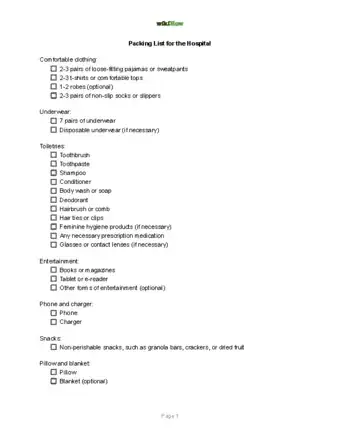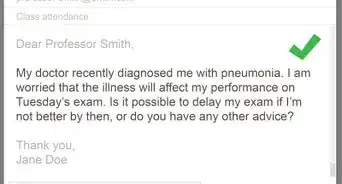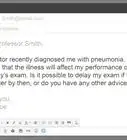This article was medically reviewed by Luba Lee, FNP-BC, MS. Luba Lee, FNP-BC is a Board-Certified Family Nurse Practitioner (FNP) and educator in Tennessee with over a decade of clinical experience. Luba has certifications in Pediatric Advanced Life Support (PALS), Emergency Medicine, Advanced Cardiac Life Support (ACLS), Team Building, and Critical Care Nursing. She received her Master of Science in Nursing (MSN) from the University of Tennessee in 2006.
This article has been viewed 25,615 times.
Hearing the news that you need to spend an extended stay in the hospital can bring many emotions — whether the joy of impending childbirth, or the disappointment of upcoming days of surgery and recovery. Along with emotional and financial concerns, you may be uncertain about what you need to pack for your stay. Depending on the nature of your stay in the hospital, you may not have much time to pack before you jump in the car. Through planning ahead and having your back packed before you leave (or at least knowing what you’ll bring), you can minimize your stress and be fully prepared for your stay at the hospital.
Steps
Packing List for the Hospital
Packing the Necessities
-
1Choose your bag. It’s important to have a big that, while not awkwardly large or heavy to carry, will still fit enough to keep you prepared while you’re in the hospital.[1] Whatever it is, make sure that it is comfortable for you to carry.
- For example, a diaper bag offers a good amount of storage space.
- You can also choose from school backpacks, “over the shoulder” messenger bags, or a variety of other items.
-
2Pack a few days’ worth of clothing. Focus on lightweight clothing; hospitals maintain a controlled temperature, so it’s unlikely that you’ll need heavy jackets or gloves.[2]
- Bring comfortable pajamas or lounging clothes.
- If you’re concerned about getting cold, bring a variety of layers. For example, a t-shirt, flannel shirt, and a cardigan or light sweater should keep you warm during the evening.
- Plan to bring underwear and comfortable socks.[3]
Advertisement -
3Pack relevant documents and paperwork. A long stay in the hospital can be stressful and full of distractions. Save yourself some trouble by bringing all official documentation you’ll need.[4] Plan ahead and bring (as needed):
- A list of all current medications, including dosage and frequency
- Birth certificate
- Medical insurance card
- Hospital forms — check with the office staff to see if you can fill them out ahead of time
- Eyeglasses, writing pen and paper in case you would like to jot something down
-
4Remember to bring any necessary medications. Although the doctors and staff at the hospital will be able to give you medications as needed, you should also pack any medications that you regularly take. This should include any prescription medication you currently take.
- Plan to pack any over-the-counter medications that you have been taking (with approval by your doctor). You may not be allowed to take them, but it is still important to bring them just in case.
- For example, pack Pepto Bismol if you have stomach virus, and an inhaler if you have asthma.
Packing for Childbirth
-
1Bring baby clothes if you’re expecting a newborn. If you’re going to be leaving the hospital with a baby, bring a few newborn-size outfits.[5] The hospital will have an undershirt for your baby, but you may want to bring the baby home in more substantial—and personal—clothing.
- Bring two or three different sizes of newborn clothing, since you won’t know ahead of time the exact size of your infant
- Also bring scratch mittens, socks or booties, a hat, and a baby blanket
- Don't forget the car seat — make sure you make all of the adjustments before you get your infant into the car
- Also consider bringing a pacifier for your infant
-
2Pack diapers and nursing materials. Both of these are necessary, even for the (potentially) short time you and your infant will be at the hospital post-birth. Pack several infant-sized diapers for your baby’s bathroom needs, and breastfeeding-specific bras and pads for yourself (or your the mother, if you are just helping out).[6] When packing, make sure to include:
- Three comfortable nursing bras
- A packet of breast pads (to contain minor leaking)
- Spare underwear (consider bringing pairs that you consider disposable)
-
3Have a copy of your birth plan. This is a typically brief document which describes — in detail — the specifics of how you would like to give birth. Give the birth plan to the attending caregivers or nurses.[7] This way, if you are asleep or on pain medication, the nurses will still follow your plan for giving birth. Your birth plan should include specifics detailing:
- Do you want to be offered pain relief? If so, what type?
- Whom do you want present in the room during labor?
- If you have a boy, would you like him circumcised?
Making Your Stay Comfortable
-
1Bring things to pass the time. The majority of your time in the hospital will be spent killing time and waiting for doctors or test results. Plan accordingly to keep yourself from getting too bored while you wait.[8] Pack a book or eReader if you plan to spend time reading.
- Pack something like a notepad and pencil if you’d like to keep a journal or list of your thoughts.
- Bring magazines, a deck of cards, or a book of puzzles, like Sudoku or crosswords.
- Focus on packing as few objects or devices as possible. Bringing a Kindle would be more efficient than packing a dozen books.
-
2Don’t forget hygiene products. These tend to get overlooked in the rush of packing — while the hospital should have a shower or sponge-bath available for you, you should also bring your own personal products. Hospital will have basic hygiene items if you forget them, but they will add a charge to your bill for these.[9] These can include:
- Deodorant
- Dental care products (toothbrush, paste, and floss)
- Feminine care products (pads or tampons)
- Hair care products (shampoo, conditioner, headband, comb or brush, etc.)
- Chapstick or lip balm
- Makeup
-
3Bring things to remind you of your home and family life. Especially if you’re going to spend more than a week in the hospital, you can avoid homesickness and bolster yourself emotionally if you bring mementos of home.[10]
- Pack some photos of you and your family at home. A group shot that includes every family member may be especially emotionally comforting. (Make sure this photo has some type of backup copy where you can make a duplicate of it, should it get lost.)
-
4Consider bringing your own pillow. Although the hospital will have pillows available for your use, you may find your own pillow to be more comfortable and comforting.[11]
- A small stuffed animal or personal blanket can have the same comforting effect.
Planning Ahead for the Unexpected
-
1Pack a small amount of cash. Although the hospital will bill your for large, medical expenses, you’ll need cash for minor day-to-day expenses. Plan to bring $20 – 40 cash.[12]
- This will be useful for buying coffee, newspapers, and items from vending machines.
- Avoid bringing credit cards — or any type of valuables — as these items can be easily stolen.[13]
-
2Bring a small selection of snacks. Although hospitals have kitchens and vending machines, you may want to avoid eating the sometimes notorious hospital food by eating out of your own bag.[14] In these cases, it’s best to bring nonperishable foods that that provide nutrition, without much sugar.
- If you want to bring any fruit or cheese, make sure to have a cooler and ice.
-
3Bring a moderate amount of work with you. If you need to work through your hospital stay, it’s OK to bring your computer or a folder of papers to the hospital with you.[15] Working at the hospital may also take your mind off of any health concerns you’re experiencing.
- Likewise, if you are a student and have work due soon, bring a textbook or two with you, so you can stay on top of your homework deadlines.
- If you bring a charger for your computer, make sure to call ahead and ask the hospital if you’ll need a special adapter for the hospital’s power outlets.
References
- ↑ http://www.bounty.com/pregnancy-and-birth/preparing-for-your-new-arrival/birth-planning/what-should-i-pack-in-my-hospital-bag
- ↑ http://www.medicinenet.com/script/main/art.asp?articlekey=60418
- ↑ http://www.parents.com/pregnancy/giving-birth/preparing-for-labor/hospital-packing-list/
- ↑ http://www.medicinenet.com/script/main/art.asp?articlekey=60418
- ↑ http://www.babycenter.com/0_moms-say-top-12-things-to-pack-for-the-hospital_10339938.bc
- ↑ http://www.bounty.com/pregnancy-and-birth/preparing-for-your-new-arrival/birth-planning/what-should-i-pack-in-my-hospital-bag
- ↑ http://www.parents.com/pregnancy/giving-birth/labor-and-delivery/birth-plan-pointers/
- ↑ http://www.medicinenet.com/script/main/art.asp?articlekey=60418
- ↑ http://www.parents.com/pregnancy/giving-birth/preparing-for-labor/hospital-packing-list/
- ↑ http://www.medicinenet.com/script/main/art.asp?articlekey=60418
- ↑ http://youngwomenshealth.org/2010/04/08/inpatient-surgery/
- ↑ http://www.medicinenet.com/script/main/art.asp?articlekey=60418
- ↑ http://www.medicinenet.com/script/main/art.asp?articlekey=60418
- ↑ http://www.babycenter.com/0_moms-say-top-12-things-to-pack-for-the-hospital_10339938.bc
- ↑ http://youngwomenshealth.org/2010/04/08/inpatient-surgery/




















-Step-14-Version-2.webp)
























































Medical Disclaimer
The content of this article is not intended to be a substitute for professional medical advice, examination, diagnosis, or treatment. You should always contact your doctor or other qualified healthcare professional before starting, changing, or stopping any kind of health treatment.
Read More...